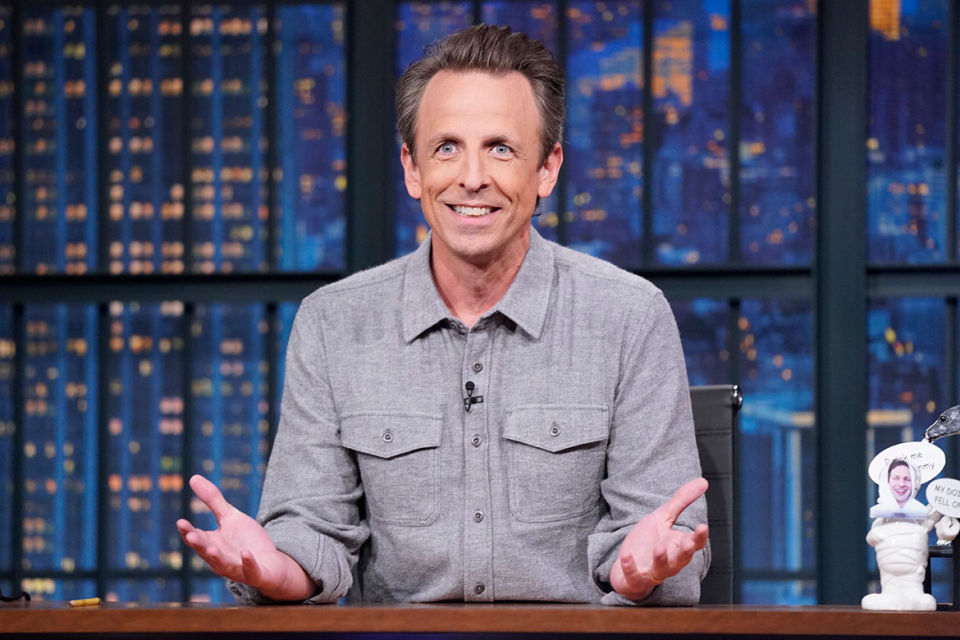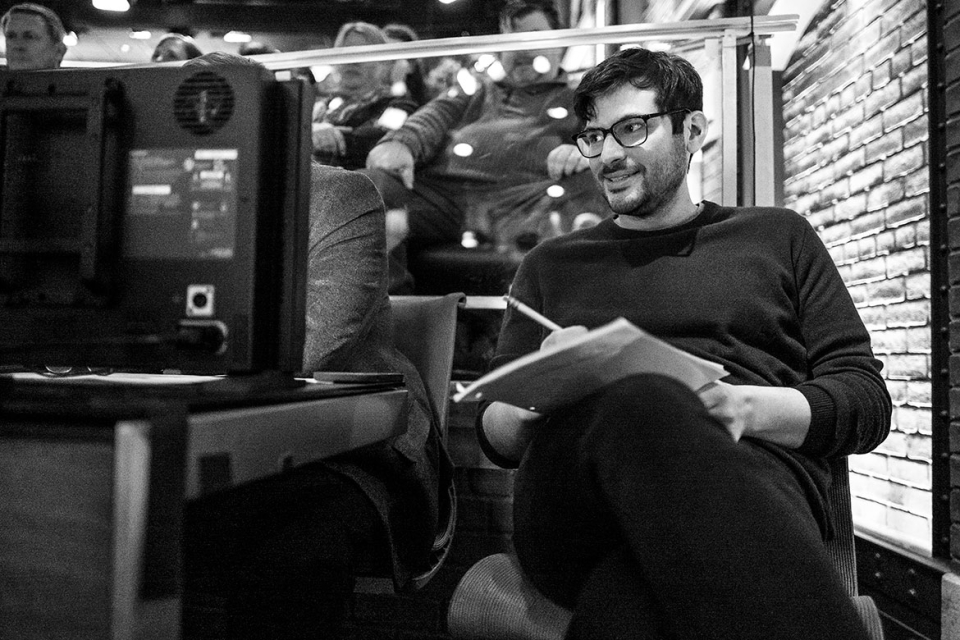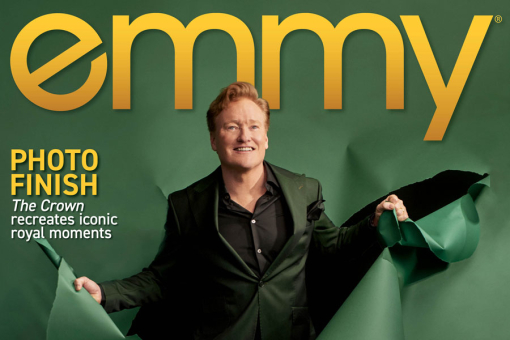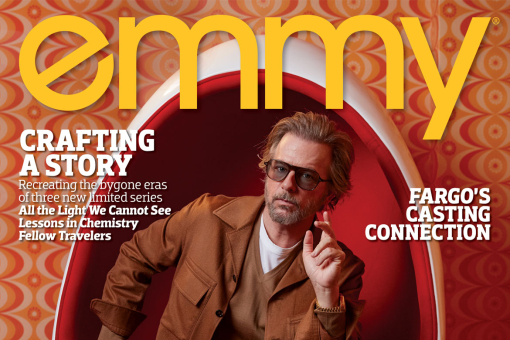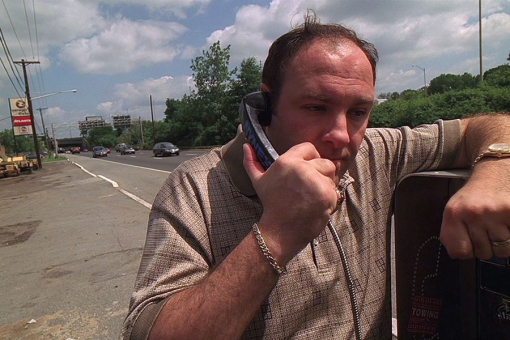TV critics have long considered "A Closer Look" the best part of NBC's Late Night with Seth Meyers. "Though they didn't introduce the segment until almost twenty months after the show launched, Meyers and his team have turned 'A Closer Look' into their biggest asset," wrote Vulture's Jesse David Fox. The longform, news-driven feature has racked up millions of views on YouTube, in addition to its popularity on the show.
While head writer Alex Baze, supervising producer Emily Erotas and the program's crackerjack graphics and editing teams all contribute, it's the pivotal partnership of writer Sal Gentile and Meyers that has made "A Closer Look" the most anticipated part of Late Night.
At first, Gentile's job was to read what Meyers had written, but his duties escalated quickly. "I can't remember how it transitioned to Sal having to write three of them a week," Meyers confesses. But Gentile does. The host told him to pitch ideas, so he did. Lots of them. "I just started to send longer and longer emails and the emails started to turn into proto-scripts," he recalls.
Since then, the dynamic duo has been turning out must-see political commentary as they, along with their fans, try to make sense of an increasingly nonsensical world. "Even though the news makes you angry," Meyers says, "you want to see someone who is using the hour to make you happier."
Meyers and Gentile spoke with emmy contributor Frank DeCaro about how the segment has evolved and come into its own.
Were you surprised that the audience was down for longform pieces?
Seth Meyers: When we started the show, the conventional wisdom was that late night was trending toward very short, poppy, celebrity-based things, and we were really bad at that. So we found our way into longform.
The audience now has come to have this expectation that we're going to lay out a thesis, tell you some details, put in a ton of jokes, a couple of tangents, and then we're going to come to a conclusion. They have patience for [up to] seventeen minutes if they know that the people who wrote it aren't just rambling.
What is the best thing Sal brings to the party?
SM: Every day Alex Baze and I get this incredible first draft from Sal which not only has great jokes, but also the thing that's the hardest for us to come up with — a beginning, a middle and an end. Then Baze and I each do a pass where we put in more jokes and build off things Sal has written. That's just the fun part of comedy writing, because Sal has done all the hard work. He's the one working in the salt mines.
Sal Gentile: Just to chime in on the salt mines — it's incredibly cathartic to do this every day. Otherwise, I'd be walking through Prospect Park, muttering to myself about the news. The most surreal thing is that two people whom I have looked up to forever — Seth and Baze — and I get to collaborate. If I write a joke and they keep going with it, it becomes this thing where we all pile funny on top of funny.
Sal, you came from cable news. What does this show let you do that you couldn't do before?
SG: Well, comedy, jokes ...
SM: I don't think you're allowed on cable news to go on a wild tangent about the cast of M*A*S*H.
But things are so crazy now that it makes perfect sense to do that!
SG: In the pre-Covid years we thought of our show as a show by sane people for sane people. To say, you're not crazy, what's happening is crazy. But then when we were all isolated, it became a show that was by formerly sane people going insane for formerly sane people going insane. The really nice thing about it was that we made this new connection with our audience that we have tried to preserve and bring back to the studio setting.
How important is online success to a late-night show now?
SM: I don't want to say two million people watching "A Closer Look" online is as important as two million people watching it on a linear broadcast. But it means a ton to us that people are engaged in the show. It's great that we have this extra reach with people who can't sit down at 12:37 a.m. to watch NBC.
SG: The online part of it is a big part. When we see that people are watching, we're like, "Okay, I'm not crazy for writing this stuff or going off on insane tangents on M*A*S*H. Or maybe I am crazy, but other people are crazy along with us."
Seth, how does "A Closer Look" allow you to stretch as a performer?
SM: "A Closer Look" has become sort of a catch-all for everything you would ever want to do as a talk-show host and a catch-all for every comedy move I have, which is two-and-a-half. If we did a desk piece called "Seth Does Political Impressions," it would stink. If we did "Seth Talks Really Fast," nobody would like that. But in the body of "A Closer Look," we get to layer them all in. Because there's this connective thread of the day's news, there's this momentum to it.
How do you know if a certain joke is going to land?
SM: We used to do a dress rehearsal of "A Closer Look" at four in the afternoon. We would bring people who were in the building up and do it for them, and then Sal and I would go back and make cuts. We don't have time for that anymore because we tape the show earlier. So now the show is the first time I'm performing it. It almost feels like improv. Sometimes there are impressions that Sal has put in the script that he doesn't even know if I can do. So at noon, I'll think to myself, "I should look up that old Seinfeld episode on YouTube," but then I forget, and halfway through "A Closer Look" I realize, "Oh, no — I've got to do Puddy."
It's scripted, yet still feels like improv. How does that work?
SG: Obviously Seth gets to make choices, but a lot of times, if I write something, he'll just "yes, and" it the way you would in an improv scene. There was a time — this is insane, I can't even remember the context — but it was Seth doing Al Pacino as Foghorn Leghorn. He just fully embraced it, and it had the most magical, improv-like feeling.
Is there ever too much news for you to tackle?
SM: There are days where after we have our meeting about "A Closer Look," and the script should be moving to cue cards, Sal will say, "Hey, this just happened. Here are three lines and one joke. I think we can fit it in."
SG: We have an incredible production team that allows me to focus on the writing. I can do my final pass, and they take over, making graphics, pulling all the images and clips, putting the montages together. I can keep paying attention to developments and shoot off an email to Seth, and we can get something into the segment really fast.
How does it feel that the job of late-night comedy now is to make sense of the news?
SM: We like to take on that job because it plays to our strengths. A lot of it is reminding people of things. The news changes so quickly that you can easily forget about something that happened six months ago, even though what's happening today is a domino that fell because of something then. We live in a world where the people who knocked over that domino six months ago are counting on you to forget they did it. We try to point out that whatever happened today was not a coincidence.
SG: We're just trying, every day, to keep our feet on the ground of reality, along with the audience. As humans, we weren't designed to process this much insane information all the time.
Is it gratifying that the audience gets so stoked for "A Closer Look"?
SG: As much as we talk about how stressful it is, it's such a joy comedically. When I watch Seth, I sit there like an audience member in the studio. I'm excited to find out if he's going to improvise something, which has happened many times.
SM: It's really cool, after working on it for years, that when you say, "Now it's time for 'A Closer Look,'" people are excited. And you ride that wave of excitement. When I know it's a real batshit one with a bunch of different voices and weird bits, it's just so fun.
The interviews for this story were completed before the start of the WGA and SAG-AFTRA strikes.
This article originally appeared in emmy magazine issue #6, 2023, under the title, "A Closer Look at "A Closer Look."

